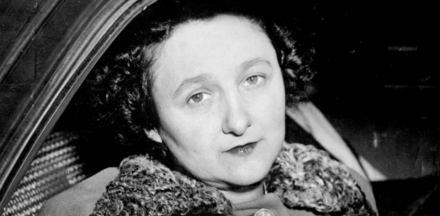
Ethel Rosenberg: Overview of the Evidence
Introduction
Ethel Rosenberg was executed by the U.S. government in June 1953 for conspiracy to commit espionage on behalf of the Soviet Union. In September 2024, the National Security Agency (NSA) released a 1950 memo written by Meredith Gardner, the agency’s top analyst of Soviet communications, to Ethel’s sons, Robert and Michael Meeropol, stating unequivocally that Ethel Rosenberg was not a spy. This most recent revelation by the NSA underscores that Ethel Rosenberg was unjustly prosecuted, tried and executed.
Timeline
June 1950: Ethel’s brother David Greenglass was arrested.
July 1950: Ethel’s husband, Julius Rosenberg was arrested and charged with conspiracy to commit espionage. The head of the Justice Department Criminal Division wrote a memo that there was insufficient evidence against Ethel, but that she could be used as a “lever” against her husband.
July and August 1950: A Federal Grand Jury was convened in the Southern District of New York:
- David swore to the Grand Jury that Ethel was not involved and that he never talked to Ethel about these matters.
- Neither David nor Ruth Greenglass mentioned anything before the Grand Jury about Ethel typing notes during an espionage planning meeting or her presence at a September 1945 meeting to advance espionage.
- On August 11, 1950, Ethel Rosenberg was arrested on the courthouse steps after testifying at the Grand Jury.
1950: Ruth told the FBI that Ethel was present at a meeting in November 1944 when Julius Rosenberg asked Ruth to recruit David as a spy. Ruth said she was reluctant; Ethel said Ruth, “should at least tell it to David.” However, Soviet files showed that Ruth was enthusiastic about recruiting David and that she did not need persuading.
FBI files revealed that after the Grand Jury, the prosecution pressured the Greenglasses to present more evidence to implicate Ethel to put pressure on Julius and obtain his cooperation in a broader investigation of Soviet espionage.
February 1951: David and Ruth made new sworn statements implicating Ethel.
March 1951: At trial, the only evidence against Ethel was testimony by David and Ruth Greenglass.
- The Greenglasses testified that at a meeting in the Rosenberg apartment in January 1945, Ethel stated that she did a lot of typing for Julius’ espionage work.
- The Greenglasses also testified that at a September 1945 meeting, Ethel typed David’s notes accompanying a sketch he gave Julius to pass to the Soviets.
- Although this testimony contradicts their sworn Grand Jury testimony, the discrepancies were never shared with the Rosenbergs’ defense attorneys or the jury, who were not privy to what was said before the Grand Jury.
- In return for their cooperation, Ruth was not indicted and David served ten years in prison.
June 19, 1953: Despite multiple judicial appeals, pleas for presidential clemency, and worldwide protest, Ethel and Julius Rosenberg were executed.
1975: Michael and Robert Meeropol filed a FOIA request forcing the release of previously classified U.S. government documents. These revealed that Federal District Court Judge Irving Kaufman, who presided over the trial, communicated secretly with the prosecutors, including U.S. Attorney Roy Cohn, who orchestrated David’s perjury at trial.
1995: the National Security Agency (NSA) released the VENONA transcriptions, Soviet cables that documented Soviet spying in the U.S. These revealed that the Soviet spy agency, the KGB, gave code names to all its agents, including David and Ruth Greenglass and Julius Rosenberg. Conversely, Ethel was never given a code name by the Soviet spy agency.
1999: Russian KGB defector Alexander Vassiliev co-authored a book, The Haunted Wood: Soviet Espionage in America, in which he claimed that the KGB file noted that “Julius and his wife recommended Ruth … as a clever and intelligent girl…” implicating Ethel in a conspiracy. However, the files do not quote Ethel, and calling Ruth clever hardly translates to conspiring to commit espionage. There are a few other similar Vassiliev reports from the KGB files; they are also indirect and ambiguous. In recent years, each of these has extensively refuted and debunked.
December 2001: On CBS’s 60 Minutes II, David Greenglass was asked if the federal prosecutor Roy Cohn pressured him to change his testimony and Greenglass said he did. Greenglass also admitted that he lied under oath about Ethel’s typing to protect Ruth from prosecution. “I would not sacrifice my wife and my children for my sister,” he said on camera. “How do you like that?”
September 2024: in response to another Freedom of Information request by Michael and Robert Meeropol and several members of the U.S. Congress, the NSA declassified and released to the family a memorandum from former chief NSA analyst Meredith Gardner, the agency’s top expert on Soviet espionage. The memo was dated August 22, 1950 – eleven days after Ethel’s arrest—and states that Ethel “knew about her husband’s work, but that due to ill health she did not engage in the work herself.”
Summary
U.S. government memos from 1950 make clear that the NSA knew that Ethel Rosenberg was not a spy, that the U.S. Justice Department had insufficient evidence to make a case against her, and that she was prosecuted as a “lever” to force her husband to offer more information about Soviet espionage. Ethel’s brother David Greenglass, the key witness, admitted the typing accusation against Ethel at trial was perjurious. The KGB, the Soviet spy agency, never gave her a code name. To advance their unjust prosecution, conviction and execution, Federal Prosecutors facilitated false testimony and carried out unethical secret communications with the trial judge during the trial and sentencing. In conclusion, Ethel Rosenberg was unjustly prosecuted, tried and executed by federal authorities who understood that she was not a spy.
